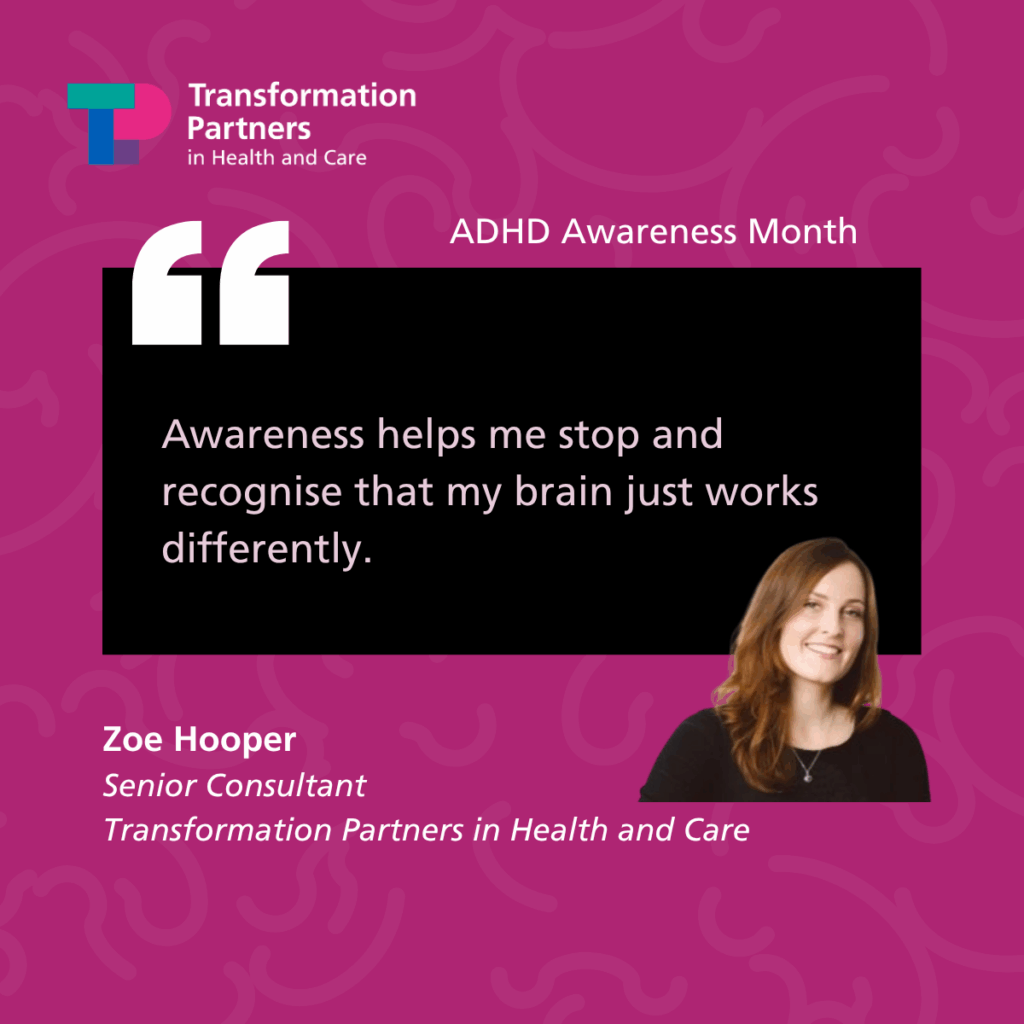This ADHD Awareness Month, we’re sharing the voices of NHS colleagues who are helping to build understanding and challenge stigma around neurodiversity. It’s important to recognise that ADHD isn’t just a set of challenges, but it can also be a source of creativity, focus, and connection.
Zoe Hooper, a Senior Consultant at Transformation Partners in Health and Care, talks about her journey, from feeling “a bit different” growing up to recognising the strengths that ADHD brings to her work and life today.
Recognising Difference: Zoe’s Journey with ADHD
For many adults, recognising and understanding ADHD is a gradual process, often beginning with a quiet awareness of being ‘different’. Zoe describes this feeling, a sense she only fully understood after her ADHD diagnosis.
“I always felt like I was a bit different to other people,” she says. “I was bullied at school, so I tried to change who I was to be liked. That led to some poor life choices and a lot of shame, which has taken years to unravel.”
Having children and working at TPHC, which champions inclusion and celebrates difference, gave Zoe the space to recognise and make sense of that feeling. “TPHC has had a really strong focus on supporting people and including everyone across our organisation,” she explains.
Conversations with supportive colleagues was a powerful step in understanding her ADHD and the ways it has shaped her career and confidence.

The Power of hyper-focus
One of Zoe’s defining strengths is her ability to hyper-focus.
“When I’m working on something I’m passionate about and love, time flies,” she says. “I’ll look up and realise I’ve been focused for eight hours and haven’t got up or walked around.”
Rather than seeing it as a challenge, Zoe recognises hyper-focus as one of her greatest assets. “I think that’s probably a skill that a lot of people don’t have,” she adds, “and I really value that.”
That deep, sustained attention allows her to produce work of exceptional quality and meaning, an ability that fuels both her creativity and her impact.
“When I’m working on something I’m passionate about and love, time flies,”
Creativity and connection
Zoe’s ADHD doesn’t just shape the way she focuses, it also influences how she thinks, creates, and connects.
“When you’ve got a brain that’s constantly jumping from thing to thing, it builds creativity because you can see connections between ideas,” she explains. “My creativity and diligence are completely linked to my ADHD and that is a large part of what makes me successful in my job.”
Her curiosity extends to the people around her, too. “I am fascinated by people and I enjoy chatting,” she says warmly. “Having a brain really focused on relationships is another key skill.”
Turning challenges into strengths
For Zoe, many of the traits linked to ADHD are also her coping mechanisms.
“My ADHD helps my ADHD,” she says. “Hyper-focus itself is a coping mechanism when I can use it in the right way. If I’m interested in something, I’ll dive in and get it done. But I’ve also learned to direct that same focus into self-development and self-care. It might sound funny, but I’ll hyper-focus on making time to look after myself.”
This mindful redirection and using the same traits that can cause overwhelm to instead support wellbeing, is something Zoe has learned through reflection and practice. It’s a powerful reminder that thriving with ADHD often means learning how to work with your brain, not against it.
“ADHD isn’t just about challenges — it’s about different ways of thinking that are incredibly valuable.”
Embracing neurodiversity
Zoe believes that neurodiversity enriches every workplace. “Neurodivergent people are some of the most fun and vibrant people,” she says. “They bring such a range of mindsets, perspectives, ideas, and energy.”
Her story reminds us that difference isn’t something to be managed and instead it is something to be valued.
“It means that you can go above and beyond and deliver something that will make a real impact”
ADHD Awareness Month: a message of understanding
As ADHD Awareness Month continues, Zoe hopes her story helps shift perceptions.
“For me, it’s about understanding myself better — being a bit kinder to myself. I’ve spent a lot of my life feeling like I should be doing things differently or trying to fit a mould that just doesn’t work for me. Awareness helps me stop and recognise that my brain just works differently.
It’s also about giving myself permission to rest and look after myself. Self-care is something I’ve had to learn — not as an indulgence, but as a necessity. When I take time to slow down or give my brain a break, I actually work better and feel better. ADHD has taught me that.”
“Awareness helps me stop and recognise that my brain just works differently.”
Support and information
The links below provide more information if you’d like to learn more or seek support:
